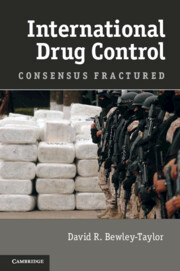Book contents
- Frontmatter
- Contents
- Figures and maps
- Tables and boxes
- Preface and acknowledgements
- Abbreviations
- 1 Introduction
- 2 Soft defection and the domestic normalization of harm reduction
- 3 Harm reduction at the UN: member state tension and systemic dissonance
- 4 Cannabis, soft defection and regime weakening
- 5 Defending the regime: the International Narcotics Control Board
- 6 Beyond regime weakening? Lessons from the UNGASS decade
- Index
Preface and acknowledgements
Published online by Cambridge University Press: 05 December 2012
- Frontmatter
- Contents
- Figures and maps
- Tables and boxes
- Preface and acknowledgements
- Abbreviations
- 1 Introduction
- 2 Soft defection and the domestic normalization of harm reduction
- 3 Harm reduction at the UN: member state tension and systemic dissonance
- 4 Cannabis, soft defection and regime weakening
- 5 Defending the regime: the International Narcotics Control Board
- 6 Beyond regime weakening? Lessons from the UNGASS decade
- Index
Summary
Preface and acknowledgements
‘Oh, you poor thing’ has been the usual response of my colleagues to the news that I was going to spend another week observing events at the annual Commission on Narcotic Drugs in Vienna. It is true that the apparently endless discussions of the placement of a comma or deliberation over whether to include the words ‘Calls upon’ or ‘Urges’ within an operative paragraph of a resolution can often be enough to induce coma. However, having studied various aspects of international drug control for nearly two decades I have become intrigued with the operation of this little-known Commission and what it reveals about the increasingly fluid field of drug policy; an area of public policy that one way or another touches all of our lives. Indeed, after my first direct experience of events at the Vienna International Centre in 2004, I realized that as an observer at the back of either the Commission’s Committee of the Whole or its Plenary sessions, I was witnessing a change in not only the nature of the issues being discussed but also in political dynamics and the intensity of the discussions. While this was the case, I struggled to understand what this meant and how all the moving parts fitted together. This book is the result of that struggle. And during what has been a longer and more painful process than I could have imagined I have accrued a variety of debts of gratitude to many people.
The content of the pages that follow has been informed and hopefully nuanced by information, insights and practical perspectives of over fifty formal interviewees. These comprise a range of parliamentarians, government, European Commission and United Nations officials, senior representatives of non-governmental organizations and fellow academics (in post and retired), in Washington DC, New York, Ottawa, London, Brussels, Amsterdam, Bern, Canberra, Sydney, Melbourne, Vienna and Tokyo. Thanks go to all those who generously gave their time to be interviewed and to the many others who were willing to discuss a myriad of related issues in a less-structured fashion.
- Type
- Chapter
- Information
- International Drug ControlConsensus Fractured, pp. xi - xiiiPublisher: Cambridge University PressPrint publication year: 2012



